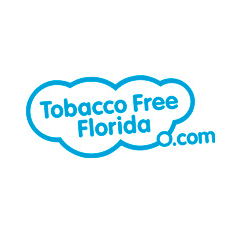It's a New Day in Public Health.
The Florida Department of Health works to protect, promote, and improve the health of all people in Florida through integrated state, county, and community efforts.
Smokeless Tobacco Use Remains an Issue
February 16, 2015

FOR IMMEDIATE RELEASE
February 16, 2015
Contact: Communications Office
(850) 245-4111
or Naylet Aguayo
media@tobaccofreeflorida.com
(786) 256-0884
~ Tobacco Free Florida is raising awareness during "Through with Chew Week" ~
TALLAHASSEE—The Florida Department of Health's Tobacco Free Florida Program is raising awareness about the dangers of smokeless tobacco, like chew and dip, to help combat this deadly addiction. "Through With Chew Week", a national public awareness campaign created to reduce the use of smokeless tobacco among young people, takes place Feb. 15—21, with the Great American Spit Out on Feb.19.
While cigarette use among Florida youth has reached an all-time low, smokeless tobacco use has not decreased when compared to a decade ago. In 2014, 5.4 percent of Florida high school students reported current use of smokeless tobacco products compared to 5.6 percent in 2004, according to the Florida Youth Tobacco Survey.1
"Smokeless tobacco products have many health consequences and are highly addictive," said Tobacco Free Florida Bureau Chief Shannon Hughes. "Youth who use smokeless products are more likely to experiment with other types of tobacco. In fact, the use of multiple tobacco products, including cigarettes and smokeless tobacco, is common among young people."
At least 28 carcinogens have been identified in smokeless tobacco.2 Users of smokeless tobacco have an 80 percent higher risk of oral cancer and a 60 percent higher risk of esophageal cancer and pancreatic cancer compared to non-users.3 Smokeless tobacco use can also lead to other oral problems, such gum disease, tooth decay and tooth loss.4, 5
Currently, there is no scientific or medical evidence that proves smokeless tobacco use is an effective method to help people quit smoking. Floridians who want to quit any form of tobacco have access to the state's free and proven-effective resources.
Tobacco Free Florida offers 3 Free & Easy Ways to Quit:
- CALL: Call the Florida Quitline at 1-877-U-CAN-NOW to speak with a Quit Coach who will help assess a user's addiction and help create a personalized quit plan.
- CLICK: Tobacco Free Florida's online cessation tool can be accessed at tobaccofreeflorida.com/webcoach.
- COME IN: Local face-to-face help is available with the help of Area Health Education Centers, find one near you at tobaccofreeflorida.com/ahec.
For more information, please visit www.tobaccofreeflorida.com/smokelesstobacco.
ABOUT TOBACCO FREE FLORIDA
The department's Tobacco Free Florida campaign is a statewide cessation and prevention campaign funded by Florida's tobacco settlement fund. Tobacco users interested in quitting are encouraged to use one of the state's three ways to quit. Since 2007, more than 126,140 Floridians have successfully quit, using one of these free services. To learn more about Tobacco Free Florida and the state's free quit resources, visit www.tobaccofreeflorida.com or follow the campaign on Facebook at www.facebook.com/TobaccoFreeFlorida or on Twitter at www.twitter.com/tobaccofreefla.
The department works to protect, promote and improve the health of all people in Florida through integrated state, county and community efforts.
Follow us on Twitter at @HealthyFla and on Facebook. For more information about the Florida Department of Health please visit www.floridahealth.gov.
1 Florida Youth Tobacco Survey (FYTS), Florida Department of Health, Bureau of Epidemiology, 2014
2 World Health Organization. Smokeless Tobacco and Some Tobacco-Specific N-Nitrosamines International Agency for Research on Cancer Monographs on the Evaluation of Carcinogenic Risks to Humans Vol. 89. Lyon, (France): World Health Organization, International Agency for Research on Cancer, 2007 [accessed 2015 Feb 10].
3 Boffetta, P, et al., "Smokeless tobacco and cancer," The Lancet 9:667-675, 2008.
4 World Health Organization. Smokeless Tobacco and Some Tobacco-Specific N-Nitrosamines International Agency for Research on Cancer Monographs on the Evaluation of Carcinogenic Risks to Humans Vol. 89. Lyon, (France): World Health Organization, International Agency for Research on Cancer, 2007 [accessed 2015 Feb 10].
5 Piano MR, Benowitz NL, Fitzgerald GA, Corbridge S, Heath J, Hahn E, et al. Impact of Smokeless Tobacco Products on Cardiovascular Disease: Implications for Policy, Prevention, and Treatment: A Policy Statement from the American Heart Association. Circulation 2010;122(15):1520–44




Connect with DOH